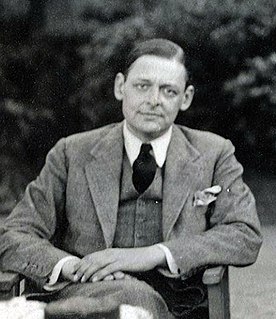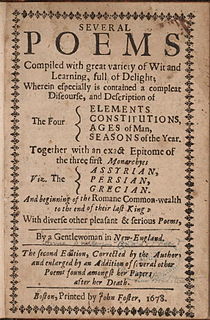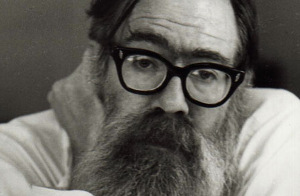Related Research Articles

Thomas Stearns Eliot was a poet, essayist, publisher, playwright, literary critic and editor. Considered one of the 20th century's major poets, he is a central figure in English-language Modernist poetry.
This article contains information about the literary events and publications of 1650.

Anne Bradstreet was the most prominent of early English poets of North America and first writer in England's North American colonies to be published. She is the first Puritan figure in American Literature and notable for her large corpus of poetry, as well as personal writings published posthumously.

American poetry refers to the poetry of the United States. It arose first as efforts by American colonists to add their voices to English poetry in the 17th century, well before the constitutional unification of the Thirteen Colonies. Unsurprisingly, most of the early colonists' work relied on contemporary English models of poetic form, diction, and theme. However, in the 19th century, a distinctive American idiom began to emerge. By the later part of that century, when Walt Whitman was winning an enthusiastic audience abroad, poets from the United States had begun to take their place at the forefront of the English-language avant-garde.

Thomas Dudley was a colonial magistrate who served several terms as governor of the Massachusetts Bay Colony. Dudley was the chief founder of Newtowne, later Cambridge, Massachusetts, and built the town's first home. He provided land and funds to establish the Roxbury Latin School, and signed Harvard College's new charter during his 1650 term as governor. Dudley was a devout Puritan who was opposed to religious views not conforming with his. In this he was more rigid than other early Massachusetts leaders like John Winthrop, but less confrontational than John Endecott.
Anne Barbara Ridler OBE was a British poet and Faber and Faber editor, selecting the Faber A Little Book of Modern Verse with T. S. Eliot (1941). Her Collected Poems were published in 1994. She turned to libretto work and verse plays; it was later in life that she earned official recognition, receiving an OBE in 2001.

John Allyn McAlpin Berryman was an American poet and scholar. He was a major figure in American poetry in the second half of the 20th century and is considered a key figure in the "confessional" school of poetry. His best-known work is The Dream Songs.
The Tenth Muse may refer to:
A gentlewoman in the original and strict sense is a woman of good family, analogous to the Latin generosus and generosa. The closely related English word "gentry" derives from the Old French genterise, gentelise, with much of the meaning of the French noblesse and the German Adel, but without the strict technical requirements of those traditions, such as quarters of nobility.
Nationality words link to articles with information on the nation's poetry or literature.
Nationality words link to articles with information on the nation's poetry or literature.

John Woodbridge VI (1613–1696) was an English nonconformist, who emigrated to New England. He had positions on both sides of the Atlantic, until 1663, when he settled permanently in New England.
Thomas Parker (1595–1677) was an English nonconforming clergyman and a founder of Newbury, Massachusetts.
Nationality words link to articles with information on the nation's poetry or literature.
Ann Stanford was an American poet.
Meditative poetry combines the religious practice of meditation with verse. Buddhist and Hindu writers have developed extensive theories and phase models for meditation.
"Here follow some verses upon the burning of our house, July 10, 1666", commonly known as "Verses upon the Burning of our House", is a poem by Anne Bradstreet. She wrote it to express the traumatic loss of her home and most of her possessions. However, she expands the understanding that God had taken them away in order for her family to live a more pious life.
Puritanism, begun in England in the 17th century, it was a radical Protestant movement to reform the Church of England. The idea of a Puritan poet may seem a bit of a contradiction as Puritans disagreed with the practice of using metaphor and verbal flourishes in speech and writing, with their beliefs in God. The Puritan movement was one for very ugly literal expression and teaching. But, over time, some room for creative expression arose and Puritan poets such as John Milton, Anne Bradstreet, Edward Taylor and John Dryden produced some of the greatest verse of their old age.

Elizabeth Wade White was an American author, poet, and activist. She was a lover of Valentine Ackland and wrote The Life of Anne Bradstreet: The Tenth Muse, about the early American poet and first American writer to be published in the Thirteen Colonies.
References
- ↑ The entire original title is: The Tenth Muse, lately Sprung up in America, or Several Poems Compiled with Great Variety of Wit and Learning, Full of Delight, Wherein especially is Contained a Complete Discourse and Description of the Four Elements, Constitutions, Ages of Man, Seasons of the Year, together with an exact Epitome of the Four Monarchies, viz., The Assyrian, Persian, Grecian, Roman, Also a Dialogue between Old England and New, concerning the late troubles. With divers other pleasant and serious Poems, By a Gentlewoman in those parts.
- ↑ Pender, Patricia (2012). Early Modern Women's Writing and the Rhetoric of Modesty. Palgrave Macmillan. p. 166. ISBN 9781137008015.
- ↑ Tonti, Kaitlin, "Seeping Through the Divide: The American Experience in Bradstreet's Verse" (2013). Seton Hall University Dissertations and Theses (ETDs). Paper 1879.
- ↑ Tonti, Kaitlin, "Seeping Through the Divide: The American Experience in Bradstreet's Verse" (2013). Seton Hall University Dissertations and Theses (ETDs). Paper 1879.
- ↑ Samuel Eliot Morison, "'Musa Decima'; or, The Life and Works of Mistress Anne Bradstreet," in his Massachusettenis de Conditoribus; or, The Builders of the Bay Colony, Houghton Mifflin Company, 1930, pp. 320–36.